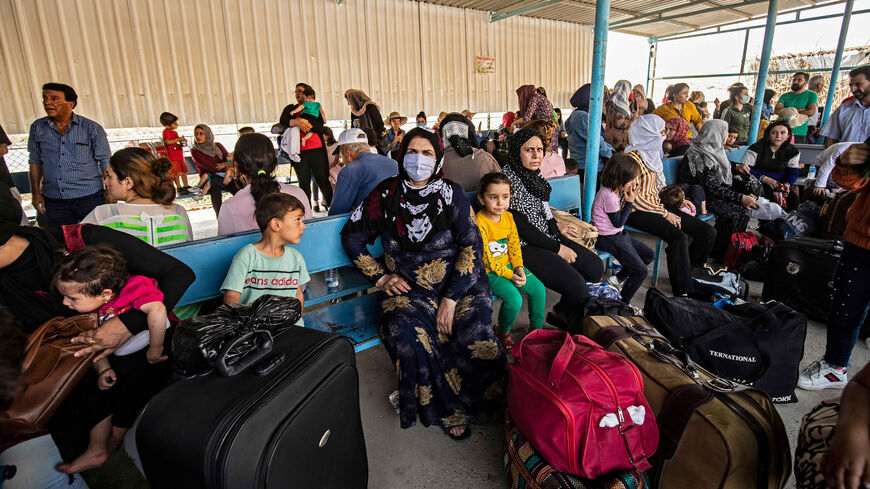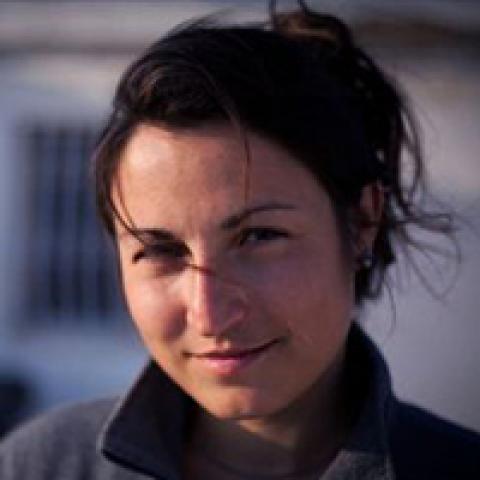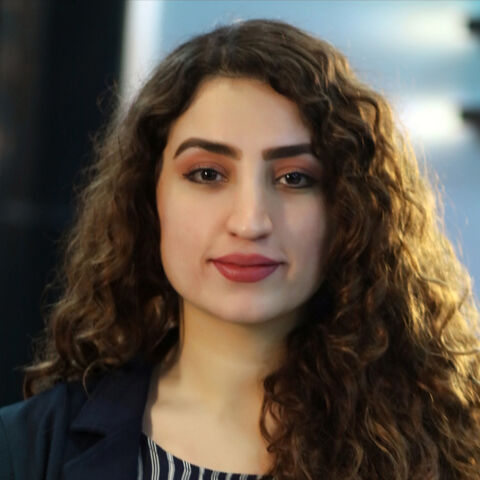QAMISHLI — Iraqi Kurdish authorities closed their only border crossing with Syria on Wednesday, disrupting trade, travel, medical trips and diplomatic visits in and out of northeast Syria. The sudden closure also prompted many humanitarian organizations to withdraw their international staff from the region.
“The closure of the crossing didn’t just impact my family, but many others as well,” Abd al-Ghani Hassan Elias told Al-Monitor from his home in the city of Qamishli, northeast Syria. Scattered around the world for many years by war, Elias’ family had planned to reunite at last in June. For the first time since their mother died two years ago during the coronvirus pandemic, two of Elias’ siblings would have been able to visit her grave and pray over it.
But after authorities in charge of the Fishkhabour-Semalka crossing announced it would close for an undisclosed period, Elias gave up on his hope to spend Eid al-Adha with his family. His elderly sister returned to Iraqi Kurdistan to avoid getting stuck in Syria and his brother canceled his visit.
“It would have been the first Eid we spend together as a family since our mother died,” Elias said. “The closure of the border really impacted us — morally and financially. My sister lost 2,500 to 3,000 euros [around $2,700 to $3,200] in travel costs.”
The Fishkhabour-Semalka crossing is an economic and humanitarian lifeline for roughly 3 million people living in areas in northeast Syria controlled by the Autonomous Administration of North and East Syria (AANES), the de facto government controlling the region. As northeast Syria’s only border crossing with a foreign country, it is the preferred passage point of thousands of people traveling every year to visit relatives and access medical care not available in northeast Syria.
The crossing is controlled on the Syrian side by the AANES and on the Iraqi side by the Kurdistan Regional Government (KRG), which manages the autonomous Kurdistan Region of Iraq.
But recurrent feuds between the AANES and the KRG — or rather between the political parties that dominate them — have led their shared border to close unpredictably and abruptly several times over the past few years. Each time, the closures asphyxiate the economy and disrupt humanitarian activities in northeast Syria, which heavily depends on the crossing.
'The breathing point' of northeast Syria
Dozens of trucks arrive at Fishkhabour every day from Iraqi Kurdistan, carrying supplies destined for northeast Syrian markets, including sugar, cement and imported foodstuff. According to an official working on the AANES side of the crossing, who requested anonymity, 70 to 100 trucks carrying commercial supplies enter northeast Syria every day through Semalka, and 150 to 200 through al-Waleed, another commercial border crossing connecting the Kurdistan Region and Syria. Al-Waleed is a key exit point for locally extracted crude oil, which is a key source of revenue for the AANES. It also closed May 11 for an undetermined period.
Due to its economic importance, Semalka is sometimes nicknamed “the breathing point of northeast Syria.” But it is also a political and humanitarian lifeline for AANES-controlled regions.
Thomas Schmidinger, political scientist specialized in Kurdish politics and history, talked to Al-Monitor about the border crossing. “It is the only semi-official border crossing of the AANES, where trade, political delegations, nongovernmental organizations (NGOs) and other humanitarian organizations can cross to north and east Syria.”
When that crossing is closed, the only way to enter northeast Syria is through areas controlled by the Syrian government. “This means that humanitarian organizations, journalists, researchers or political delegations that do not cooperate with the regime or that do not receive visas from the regime no longer have access to the region,” Schmidinger said.
Semalka is also the preferred transit route for many people in northeast Syria because the crossing is not recognized nor managed by the Syrian government, and their entry into the country doesn’t appear in their passport. “This is essential for people who only have residence permits abroad and don’t have a foreign nationality,” Elias said. “Many of those who sought refuge abroad during the war fear that the countries in which they now live will monitor their movement, and that they will lose their refugee status if they return to Syria.”
But those most affected by the sudden closure are probably medical patients trying to access care outside northeast Syria, where health-care services are limited. Saleh Suleiman, a Syrian Kurd who lives in Iraqi Kurdistan, managed to get his elderly parents and two special needs brothers to visit him for several months for treatment. But they are now stuck on the Iraqi side, he told Al-Monitor, and every month they spend there costs them around $400 in residency fees.
Humanitarian impacts
The sudden closure also took a toll on the NGOs, most of which rely on the crossing to bring their international staff to northeast Syria. Over the past week, several international NGOs quietly withdrew their international staff from the area, wary of leaving them trapped for an unknown period there. Other NGOs that are not based in the area but work there through local partners were also impacted.
Alicia Allgauer, an aid worker with Volkshilfe Osterreich (People’s Aid Austria), spoke with Al-Monitor after unsuccessfully attempting to enter northeast Syria on Monday. “We wanted to go to northeast Syria to visit our project partners for the first time, to get to know their team, see their work, visit beneficiaries and do monitoring visits," she said.
One of the goals of the visit was to plan new earthquake relief projects in the Kurdish-populated enclave of Sheikh Maqsoud, which has been dramatically underserved in the aftermath of the earthquake because it is entirely surrounded by checkpoints of the Syrian regime, and access to the area is very limited.
But despite securing the necessary approvals weeks in advance, when Allgauer and her three colleagues reached the border on Monday, they were turned back by Iraqi Kurdish authorities. “We’ve been planning this visit for the past two months, and a lot of work and money went into it,” she said. The team also had to cancel a workshop with local colleagues. “Of course, it’s not a life-threatening impact, but for the people we serve and for our project partner, it’s very hard,” she added.
As long as the border remains closed, NGOs will also face challenges procuring certain goods for their activities and securing cash to run their operations and pay salaries. Due to international sanctions adopted during the war, there are no international banks nor ATMs in Syria. The only way to transfer cash into the country is through “hawalas,” a traditional money transfer system that relies on networks of trusted local agents. But their ability to physically transfer sufficient volumes of US dollars into northeast Syria is directly impacted by border restrictions, with ripple effects on money transfer fees.
The NES Forum, the main platform coordinating NGOs’ work in northeast Syria, did not respond to a request for comment on the humanitarian impact of the border closure.
A bargaining chip
Iraqi Kurdish authorities did not give an official reason for closing the border. But previous instances were all linked to political tensions between two main Kurdish parties — the Iraq-based Kurdistan Democratic Party (KDP) and the Syria-based Democratic Union Party (PYD), a leading component of the political coalition that formed the AANES.
“Unfortunately, the border is a bargaining chip in the intra-Kurdish conflict between the Iraqi KDP and its allies in Syria — the so-called Kurdish National Council in Syria [KNC] and the Syrian PYD, which in turn is allied with the PKK,” Schmidinger said. The Kurdistan Workers Party (PKK) is a Turkey-based Kurdish party seen as a terrorist organization by Ankara, and a historic enemy of the KDP.
The last border closure, in December 2021, lasted 40 days. It had also closed in June 2021 for travelers during a spike in intra-Kurdish tensions, but remained open for humanitarian travel.
“The specific triggers [of border closures] are different each time,” Schmidinger said. This time, the KDP-affiliated KNC stated the closure is linked to the AANES preventing some of their members from crossing out of Syria to attend the inauguration of a new museum. Officials on the KRG side and the AANES side of the border all declined to comment on this issue.
Whatever its catalyst, this new border closure illustrates a simple truth that humanitarian actors have been denouncing for years: a single entry point into northeast Syria leaves its residents extremely vulnerable to political obstruction.
Northeast Syria used to be connected to federal Iraq through the Yaroubiah crossing, which a United Nations Security Council resolution authorized humanitarian agencies to use to bring aid to the region despite obstruction by the Syrian regime. Several hundred tons of medical equipment and 19 UN shipments went through the crossing between early 2018 and January 2020, when Yaroubiah closed following Russian pressure at the UN Security Council.
Today, UN agencies no longer have a cross-border mandate in northeast Syria, which means they need Damascus’ approval to operate there. NGOs are discreetly using Fishkhabour-Semalka, but they don’t have an alternative when the border closes.
Around 4,000 people flocked to Semalka on Wednesday, the anonymous crossing official said, which is equivalent to what the crossing normally processes in a month. Due to this high demand, the deadline for certain travelers, including NGO staff, to cross back into Iraqi Kurdistan was extended until May 19. “The only thing that won’t stop is the reception of corpses,” the border official added.
The border could reopen virtually any day — once politicians on both sides make peace. This is the hope that relatives separated by the border and medical patients trapped inside Syria cling to. “We hope that political parties and decision-makers will think a little more about the conditions we people face, instead of their political interests,” Elias concluded.








